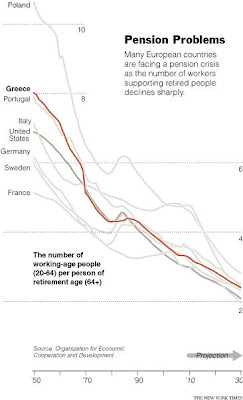Will Canada Lead G7 Rate Hikes?

Reuters reports, World trade growth slows in 1st qtr : Global trade volumes in the first three months of this year were 5.3 percent higher than in the previous quarter, representing slightly slower growth than in recent months but still a healthy rebound from the crisis, data from the Dutch CPB institute showed on Monday. The CPB, whose data are used by the European Commission and World Bank, said world trade in the three months ended February had grown by 5.8 percent over the previous three months and grown 6.0 percent in the last quarter of 2009. Trade growth remained strongest in Asia and Latin America, but was relatively low in the euro area, it said in its latest monthly world trade monitor. On the more volatile monthly figures, world trade volumes were 3.5 percent higher in March than in February, when they grew 1.7 percent. Trade volumes grew worldwide except for Japanese imports, and both imports and exports in the euro area were strong. World trade in ...







